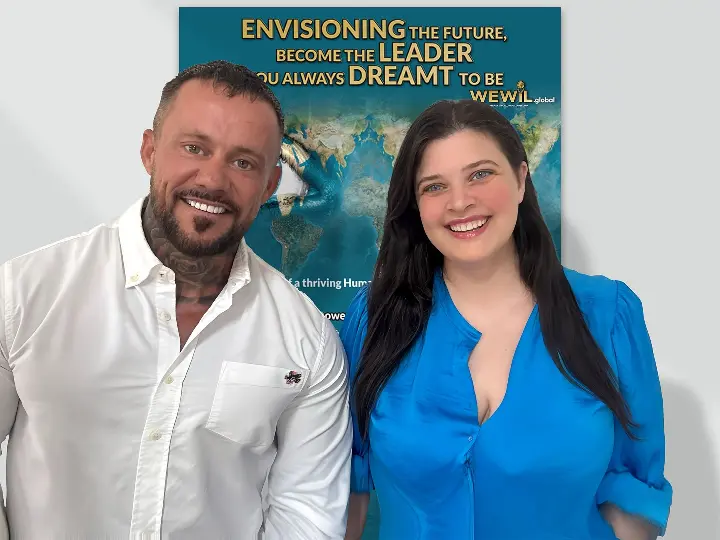It is important not only to recognize but also to act when you see your mental health faltering, when you experience trauma from a very young age, when figures you look up to try to deprive you of your right to dream; it is even more important to not give up when you fall, but to find the courage to face it, rise even stronger, and reach for the dream itself.
In the context of our mission here in WEWiL.global promoting mental health and trauma awareness, as well as building resilience, we are shining a light to exceptional elite athletes who have courageously acknowledged their mental health challenges and trauma, prioritizing their well-being above all.
We are also celebrating those elite athletes who, through their unwavering perseverance and resilience, have overcome significant adversity and injuries to achieve success and reach the podium at the 2024 Paris Olympics.
Their stories not only inspire us but also underscore the importance of mental health in achieving peak performance and personal triumph.
Their #courage and #resilience remind us that no obstacle is insurmountable.
Their #journey teaches us the power of #perseverance, and their example lights the way for countless others to follow.

In 2018 Simone Biles stepped forward with her account of sexual abuse by former Team USA doctor Larry Nassar. Participating in the “Call Her Daddy” podcast last April, Biles explained how she continues to process the abuse and the impact it has had on her life. “You can’t compress trauma that much longer, …I wanted to be in a good enough place and to have the proper help lined up before I spoke out because that stuff was so traumatizing,” the gymnast shared. “And I truly don’t understand how I did what I did under those circumstances and how I put on a face”.
In August of 2021 Biles withdrew midway through the women’s team final in Japan, prioritizing her mental health as she dealt with a case of the “twisties” – a dangerous phenomenon that gymnasts experience in which they lose their perception of their body while in the air, sparking a global conversation about Mental Health and sports. At the time, Biles said she felt as if she was walking away from a dream she had worked five years to achieve. Haters online were accusing her of quitting on her team and, even failing her country. “This is a mental injury that they can’t see,” Biles recalled. “Because they couldn’t see it, they couldn’t relate to it. They couldn’t grasp it.”
Three years later at the 2024 Paris Olympics after three gold medals and one silver, making her the world’s most decorated gymnast and a Greatest of all time athlete (G.O.A.T.), she has put into practice the example that inspired so many millions across the globe, including therapy sessions before two of her biggest competitions in France, with her U.S. based therapist. “After all these years of putting the mental work in, “it’s paid off… I did see my therapist the other day…. We’re taking it day-by-day to see if I need extra therapy while I’m here, but so far, so good,” said Biles. “The Olympics is such a draining process for the athletes when it’s multiple days of competition, so you definitely have to be on top of your mental, as well as your physical. So as long as we’re doing that, then, we’re good.”

From enduring racist comments as a child at school, where he and his sister were called “the black kids,” to reporting a coach at 18 who had made racist remarks since he was 13— “Blacks don’t do pole vault” and “Go back to your country both, you and your mother”— Emmanouel Karalis faced significant challenges. Despite the emotional trauma and discrimination, he continued to train and compete, reaching new heights with the unwavering support of his family. In August 2022, he announced on Instagram that he needed a break from sports to focus on his mental health and find balance.
“For the first time this year I suffered a full blown panic attack which consequently made me sink into anxiety and depression for quite some time. I pushed myself very hard in order to reverse this situation, but that just made things worse and unfortunately the “bad” Manolo dominated and took over… I am tired and I feel completely exhausted. I am ending my season here. I need some rest & I need to focus on my mental health for a while. I need to step back and take a break in order to get my smile bacκ” he concluded.
Two years later, at the Paris Olympics, he soared to 5.90 meters in the pole vault final and won the bronze medal. “Now that I’m at peace, I reflect on my journey as an athlete and a person—on the challenges, the depression, the racism, the injuries. I can say that all of these experiences have shaped me into who I am today: strong, confident, and a bronze medalist at the Olympic Games”.

The 27-year-old sprinter made history by becoming the first American to win gold in the men’s 100-meter since Justin Gatlin’s victory in 2004. After his triumph, Lyles shared a powerful message online: “I have asthma, allergies, dyslexia, ADD, anxiety, and depression. But I will tell you that what you have does not define what you can become. Why not you?”
Lyles’ remarkable journey from personal struggles to Olympic success embodies the essence of his message. He challenges us all to ask, “Why not me?” Regardless of the obstacles we face—whether they are physical, cognitive, or mental—Lyles inspires us to recognize that our potential extends far beyond our circumstances. His story is a compelling reminder that greatness is within reach for everyone, no matter the challenges we encounter.

Among the athletes who have endured traumatic events that have deeply impacted them is the 23-year-old Greek shooting champion Emmanouela Katzouraki. On February 28, she was on the tragic train that collided with a freight train in Tempi, Greece, resulting in the loss of 57 lives. At the time of the collision, she was in the rear cars and emerged almost unscathed, with only minor leg injuries. Instead of discussing her trauma publicly, she chose to remain silent. She used social media solely to thank those who reached out, reassure everyone that she was okay, and encourage people to donate blood for the injured.
Her coach, Giorgos Salavandakis, reflected on her resilience in an interview before she competed again after the accident: “She is definitely a fighter. She chose to be with us rather than stay at home. I hope this helps her. I don’t care about the result; I care about her mental well-being. We will be by her side. We are all going to the competition with a heavy heart.”
Katzouraki went on to achieve notable successes, including winning third place at the Shooting World Championships in Baku and setting a new Greek record in skeet qualification. These achievements earned her a spot in the Paris 2024 Olympic Games.
Today, 17 months after the traumatic accident, Katzouraki competed in her first-ever Olympic Games. With an impressive performance, she scored a perfect 25/25 in the 4th and 5th rounds of the women’s skeet qualification, advancing to the final as the leader. She finished 5th in the women’s skeet final, setting the stage for a potential Olympic medal in Los Angeles.

From the war-ravaged Belgrade of the former Yugoslavia, where he practiced hitting tennis balls in bombed-out sites, to reaching the pinnacle of his sport, the renowned Novak Djokovic exemplifies resilience, perseverance, and determination. Despite setbacks at the London, Rio, and Tokyo Olympics, and a devastating right knee injury at Roland Garros last June, Novak’s resolve never wavered.
Choosing to undergo surgery and adhere to a demanding recovery regimen, he made a comeback at Wimbledon in early July. Although he lost to Spanish player Carlos Alcaraz in the final, Djokovic showcased his remarkable grit and fortitude.
Nearly a month later, Nole overcame the 21-year-old Spaniard at the Olympic Games, achieving his long-sought Grand Slam and securing the gold medal for Serbia at the age of 37. His journey underscores the power of resilience and perseverance in the face of adversity.

Lefteris Petrounias, often hailed as the “Lord of the Rings,” has achieved a remarkable Olympic record with one gold medal and two bronze medals in Men’s Rings. His journey to this point, however, has been marked by significant hurdles and unwavering perseverance. After securing a bronze medal at the Tokyo 2021 Olympics, Petrounias faced another surgery, further testing his resilience.
Despite these challenges, Petrounias remained steadfast. Supported by his wife and children, he dedicated himself to rigorous training and, in 2024, once again took the podium, earning a bronze medal on the rings. Reflecting on his journey, he shared, “These past three years have been a testament to hard work and dedication. I’ve had three European titles, one World Championship, and another surgery. Now, at 33, with various responsibilities, our focus was on achieving a medal. While aiming for the top position is always the goal, securing a medal was our priority. This achievement on the rings was a significant milestone and a testament to our determination.”
Looking ahead, Petrounias has reaffirmed his commitment to the sport by participating in the 2028 Los Angeles Olympics. His story exemplifies resilience and perseverance, showing that true champions continue to strive and overcome, no matter the obstacles they face.
Thank you for inspiring us to go above and beyond
Thank you for breaking the #mentalhealth and #trauma stigma
Thank you for being YOU.
We must challenge the #stigma that seeking Mental Health support and Therapy when needed is a sign of weakness. Mental health is just as important as physical health, and reaching out for help is a brave and proactive step towards well-being and personal growth.
The Truth,
✅Even The First Session Can make you feel stronger
✅Therapy must have a starting point and an ending point
✅Embracing #RESILIENCE
✅Discover Your True Mission
If you’re feeling that something isn’t right or if you need a supportive friendly empowering space to share your struggles, don’t hesitate to REACH OUT to [email protected]
#championingmentalhealth



